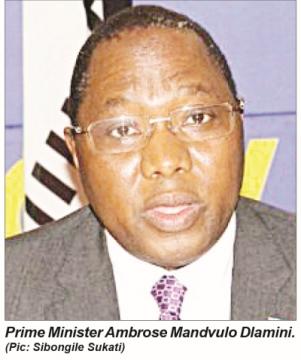GOVT EASES PARTIAL LOCKDOWN

MBABANE – Even though the country has now recorded 123 positive COVID-19 cases and a second death, government has introduced an eased partial lockdown.
This is with effect from tomorrow, Friday May 8, 2020. However, a time frame for the duration of the eased partial lockdown was not indicated.
The eased partial lockdown was announced yesterday by the Prime Minister, Ambrose Mandvulo Dlamini, during a press conference held at 6pm at Cabinet Offices.
As a result, manufacturing and production companies that have international orders to fulfil shall operate under strict World Health Organisation (WHO) and the Ministry of Health guidelines. Government has stated that screening and testing of staff will be mandatory, including adoption of core measures of prevention; that is the provision of hand-washing facilities, sanitisers and masks.
This in essence means that the textile and apparel industry will reopen as it has international orders.
Measures
Dlamini said the measures of the eased partial lockdown allowed the opening of the economy to other businesses, which included retail clothing shops, tailors and dressmakers (that produce face masks and PPEs) to operate three days a week.
He said the aforementioned would be allowed to operate on Mondays, Wednesdays and Saturdays, between 9am and 3pm.
The PM further had good news for furniture shops as he said they would be allowed to operate three days a week on Tuesdays, Thursdays and Fridays between 9am and 3pm. He said dry cleaners would also operate three times a week under similar conditions as furniture shops.
“The country is embarking on a process of gradually easing the partial lockdown on the economy. This is in line with similar measures recently taken by other countries in the region and in the world,” said Dlamini.
He, however, emphasised that members of the public were expected to fully comply with the COVID-19 regulations throughout the process.
Dlamini said the seven businesses which would be allowed to operate during the eased partial lockdown would have to demonstrate capability to implement strict COVID-19 regulations and hygiene standards to prevent the spread of the virus.
“They will have to seek permission to operate from the Ministry of Commerce, Industry and Trade, where they will prove that they have put in place very strong and stringent systems adhering to health precautions and ensuring that employees are able to practise social distancing, have adequate hand-washing facilities, sanitisers, wear masks, among others,” said Dlamini.
He said this could also include the screening of workers.
Dlamini said any company failing to meet or comply with these precautionary measures will either be closed or denied permission to operate.
“It is important to emphasise that the eased measures do not mean all business will be allowed to operate,” said the PM.
Meanwhile, the PM said the world continued to battle with limited success, a virus that systematically took the lives of thousands of people each day around the globe.
He said what started as a modest illness in China in December 2019, had turned into a monster that had put to test the versatility of international health systems, and clearly no country would emerge unscathed. “Most countries are clamouring for lasting solutions to address and eventually tame COVID-19 completely, and we face the prospect of living with the effects of this virus for the foreseeable future,” he said.
He said six weeks ago, at the counsel of His Majesty King Mswati III, Eswatini joined the rest of the world in introducing a partial lockdown with the main goal being to defer the epidemic peak and to give the health system time to put in place measures to flatten the curve and create capacity to manage a surge in positive COVID-19 cases.
He said to a large extent, this had been achieved though there was still more ground to cover.
The PM stated that the capacity of the Lubombo Referral Hospital had been improved and more beds would be added to enable the facility to handle up to 200 patients at a time. “Similarly, the TB Hospital in Manzini is getting the required make-over to be able to accommodate more patients in case of a surge in positive cases,” said Dlamini.
Educational
He added that over 90 per cent of healthcare workers had been trained on COVID-19 and many more emaSwati across communities had been reached with information and educational material on the coronavirus. He said with all the measures in place, considerations had to be made to determine if the country’s health system was capable of detecting and absorbing a resurgence of cases.
“The experiences of other countries have taught us that no health system in the world has adequate capacity, hence it remains important to avoid a complete easing of the partial lockdown measures,” he said. However, Dlamini said the importance of opening up the economy to allow for restricted business activity was crucial.




 del.icio.us
del.icio.us Digg
Digg
Comments (0 posted):